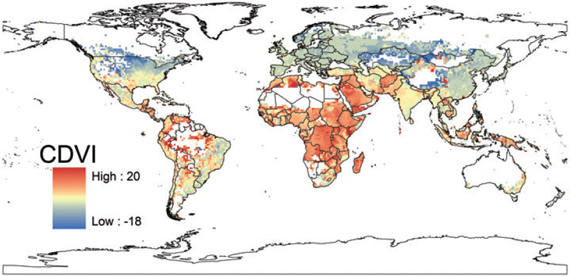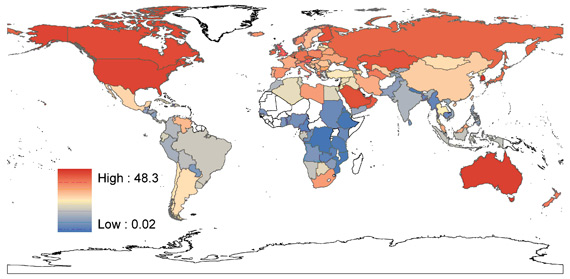 Arguments
Arguments
 Software
Software
 Resources
Comments
Resources
Comments
 The Consensus Project
The Consensus Project
 Translations
Translations
 About
Support
About
Support


Latest Posts
- Skeptical Science New Research for Week #18 2024
- At a glance - Clearing up misconceptions regarding 'hide the decline'
- Pinning down climate change's role in extreme weather
- 2024 SkS Weekly Climate Change & Global Warming News Roundup #17
- Fact Brief - Is Antarctica gaining land ice?
- Simon Clark: The climate lies you'll hear this year
- Skeptical Science New Research for Week #17 2024
- Water is at the heart of farmers’ struggle to survive in Benin
- At a glance - The difference between weather and climate
- India makes a big bet on electric buses
- 2024 SkS Weekly Climate Change & Global Warming News Roundup #16
- EGU2024 - An intense week of joining sessions virtually
- Skeptical Science New Research for Week #16 2024
- How extreme was the Earth's temperature in 2023
- At a glance - Is the science settled?
- What is Mexico doing about climate change?
- 2024 SkS Weekly Climate Change & Global Warming News Roundup #15
- Fact Brief - Did global warming stop in 1998?
- Skeptical Science New Research for Week #15 2024
- EGU2024 - Picking and chosing sessions to attend virtually
- At a glance - The Pacific Decadal Oscillation (PDO) is not causing global warming
- Climate Adam: Is Global Warming Speeding Up?
- 2024 SkS Weekly Climate Change & Global Warming News Roundup #14
- Gigafact and Skeptical Science collaborate to create fact briefs
- Skeptical Science New Research for Week #14 2024
- How can I make my retirement plan climate-friendly?
- At a glance - Global warming and the El Niño Southern Oscillation
- A data scientist’s case for ‘cautious optimism’ about climate change
- 2024 SkS Weekly Climate Change & Global Warming News Roundup #13
- Skeptical Science New Research for Week #13 2024
Archived Rebuttal
This is the archived Basic rebuttal to the climate myth "CO2 limits will hurt the poor". Click here to view the latest rebuttal.
What the science says...
|
Those who contribute the least greenhouse gases will be most impacted by climate change. |
The central question of climate change is, How will it affect humanity? This question can be examined by estimating which regions are most vulnerable to future climate change (Samson et al 2011). The researchers then compared the global map of climate vulnerability to a global map of carbon dioxide emissions. The disturbing finding was that the countries that have contributed the least to carbon dioxide emissions are the same regions that will be most affected by the impacts of climate change.
To estimate the impact of climate change on people, James Samson and his co-authors developed a new metric called Climate Demography Vulnerability Index (CDVI). This takes into account how regional climate will change as well as how much local population is expected to grow. They incorporated this index into a global map and found highly vulnerable regions included central South America, the Middle East and both eastern and southern Africa. Less vulnerable regions were largely in the northern part of the Northern Hemisphere.

Figure 1: Global Climate Demography Vulnerability Index. Red corresponds to more vulnerable regions, blue to less vulnerable regions. White areas corresponds to regions with little or no population (Samson et al 2011).
Next, they created a map of national carbon dioxide emissions per capita. They found the countries most severely impacted by climate change contributed the least to greenhouse gas emissions. It is quite striking that blue, less-polluting regions in the CO2 emissions map correspond to the red, highly vulnerable areas in the vulnerability map.

Figure 2: National average per capita CO2 emissions based on OECD/IEA 2006 national CO2 emissions (OECD/IEA, 2008) and UNPD 2006 national population size (UNPD, 2007).
The study didn't delve into the question of which countries are least able to adapt to the impacts of climate change. But it doesn't take a great leap of the imagination to surmise that the poor, developing countries that emit the least pollution are also those with the least amount of infrastructure to deal with climate impacts. So we are left with a double irony - the countries that contribute least to global warming are both the most impacted and the least able to adapt.
This research put into perspective those who try to delay climate action, arguing that "CO2 limits will hurt the poor". This argument is usually code for "rich, developed countries should be able to pollute as much as they like". This presents us with a moral hazard. If those who are emitting the most greenhouse gas are the least affected by direct global warming impacts, how shall we motivate them to change?
Updated on 2011-03-29 by John Cook.
THE ESCALATOR

(free to republish)
























































